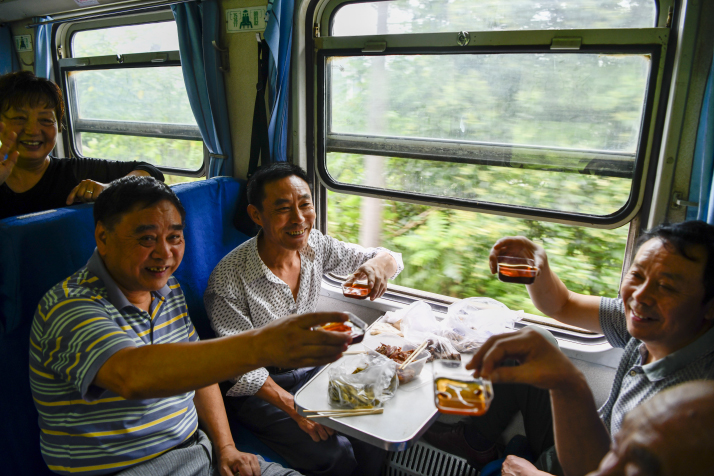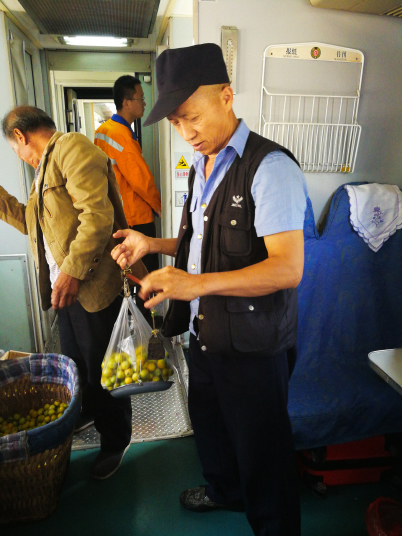|
||||||||||
| Home Nation World Business Opinion Lifestyle ChinAfrica Multimedia Columnists Documents Special Reports |
|
||||||||||
| Home Nation World Business Opinion Lifestyle ChinAfrica Multimedia Columnists Documents Special Reports |
| ChinAfrica |
| Life in the Slow Lane |
| China's unprofitable slow trains give villagers an affordable travel option |
| By Li Jing | VOL.11 October ·2019-09-30 |

Passengers enjoy their trip on a slow train in southwest China's Sichuan Province (XINHUA)
What comes to mind at the mention of China's railway? A high-speed train traveling at 350 km per hour? A rail network extending over 130,000 km? Overcrowded stations? Or perhaps, Chinese rail projects in Africa and elsewhere in the world?
These are just some of the facets of China's railway, but they do not tell the whole story. In remote mountainous rural areas, far from prosperous cities and smart technology, many slow trains that run at a speed of around 60 km per hour are still in operation. Train No.6162, which travels between Kunming City in Yunnan Province and Panzhihua City in Sichuan Province, is one of them. Every morning at 6:54, Train No.6162 snakes its way out of Kunming Station. For the next seven hours and 46 minutes, the train traverses the mountainous region of southwest China, stopping at 20 stations, before finally arriving at Panzhihua Station at 2:40 p.m. After a brief stop, the train returns to Kunming.
Local passengers
Passengers on Train No.6162 are mostly local villagers. Some carry large baskets on their backs filled with fruits and vegetables.
"I grew these beautiful apples myself, and I can give you a good price," Qi Derong told passengers. The 58-year-old man tries to keep his balance in the moving train while marketing his fruits to potential customers.
Qi comes from Guangtong Town in Chuxiong Yi Autonomous Prefecture of Yunnan Province, where Train No.6162 stops every day. Previously, he had to travel all the way to Yuanmou County, located more than 100 km from his hometown, to sell his agricultural produce. This meant very high transportation cost for very little profit.
"I can sell my fruits and vegetables directly on the train now. Since transportation costs are very low, I can lower my prices, so I have more customers. I have already sold more than 20 kg this morning," Qi told ChinAfrica.
Thanks to Train No.6162, many villagers can now sell their agricultural produce to passengers or transport and sell them at markets in bigger nearby cities.
Before returning home, Qi usually helps his fellow villagers buy food and daily supplies. "It is not easy for people living in small mountain villages to buy products. So, they ask me through WeChat to help them buy what they need. When the train stops at their village station, I give them the things through the coach window," he explained.

Qi Derong sells fruit on the train (Li Jing)
Operating at loss
In order to support the business of small traders, Train No.6162 also offers lockers in which agricultural produce and goods can be stored.
"Many villagers take our train to neighboring counties, where they sell or buy chickens, ducks, piglets and other livestock. These animals can be put in the space between two cars or in the luggage car," explained Yang Zhaoxiang, Conductor of Train No.6162. As a general rule, it is prohibited to carry live animals on passenger trains. Train No.6162 made an exception to make life easier for local villagers and help them conduct their business activities.
According to Yang, the train crosses some of the region's less developed areas. It has become an essential means of transport for local inhabitants.
"Although villagers now have higher incomes than before, not all families can afford to buy a car. Students who go to school and residents who go to the city to shop all take our train. The train stops at almost all stations along the way, and the shortest journey time between two stations is six to seven minutes. All this would be impossible with a high-speed train," Yang told ChinAfrica.
In addition to making life easier and more convenient, the train also tries to lessen the economic burden of villagers. The full fare for the 351-km trip is only 39.5 yuan ($5.6). In comparison, the cost of renting a car to transport agricultural produce would be 200 yuan ($28.6), according to Yang.
"We have also reduced freight costs: It only costs 4 yuan ($0.56) to transport 40 kg of cargo from Kunming to Panzhihua, while it would cost at least 40 yuan ($5.6) on a normal train," said Yang, adding that Train No.6162 was operating at a loss.
Currently, a total of 81 trains operate on similar routes, accounting for nearly 6 percent of the total number of passenger trains in China. They mainly operate in the less developed areas in southwest, northwest and northeast China. In addition, the state-owned China State Railway Group Co. Ltd. (China Railway) operates 1,651 passenger trains with fares below operating costs, representing 20 percent of the total number of passenger trains in China. These trains travel through 592 poor counties across the country.
Train No.K1567, for example, travels between Baotou City in Inner Mongolia Autonomous Region and Dalian City in Liaoning Province. Eight of the 26 stations serviced by this train are located in poor counties with an arid natural environment. In this region, Train No.K1567 has become an essential means of transportation for livestock farmers and those needing to go to hospital.
During the 2019 Spring Festival holiday, Chinese Premier Li Keqiang boarded such a train. Although China has high-speed trains that can travel at speeds of 350 km per hour, he said trains that service smaller stations and offer low fares are still needed. A developing country with a vast territory and a big population like China must consider both efficiency and equity, said Li.
Slow but pleasant
"We give water to passengers and we chat with them every day," said Yang. According to him, staff members of Train No.6162 strive to build friendly relationships with passengers and make their journey as pleasant as possible.
The train also has a reading area where passengers can borrow books for free. China Railway Kunming Group, the company that operates Train No.6162, has also set up vo-
lunteer groups along the line. The volunteers are railway staff members who spend some of their free time helping passengers.
"We try to help children and the elderly who travel alone," Li Longfei, an employee of the Kunming-Xining Railway, told ChinAfrica. "We not only bring passengers to their destination safely, but also try to bring them a little bit of joy on the way there."
(Comments to lijing@chinafrica.cn)
|
||||||||||||
| About Us | Contact Us | Advertise with Us | Subscribe |
| Copyright Beijing Review All rights reserved 京ICP备08005356号-5 京公网安备110102005860号 |